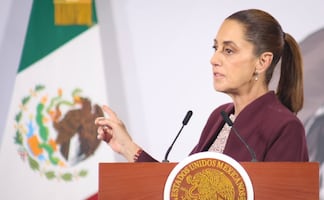Más Información

Sheinbaum no ve necesidad de que FGR investigue a Julio Scherer; “¿por qué no hablan de García Luna?”, expresa

Nodal y Ángela Aguilar fueron quienes presenciaron el enfrentamiento armado en Zacatecas: fiscal del estado

ASF reporta presuntos daños al erario por más de 65 mil mdp en ejercicio presupuestal 2024; realizó 2 mil 265 auditorías

Avanza en Senado nuevo permiso para que 12 soldados de EU ingresen a México; capacitarán a tropas nacionales

Detienen a otras tres personas relacionadas con homicidio de Carlos Manzo; eran parte del área operativa de “El Caos”
One conclusion can be drawn from Trump’s first days in office: he does not wish to see the verb “dissent” linked to his administration.
Massive popular protests, beginning with the “Women’s March” the day after he was sworn as 45th president of the U.S., angered him, badly. But what really drives the new U.S. president nuts is the dissent he finds at home. Controversial decisions and the ways of the Trump administration have stirred a feeling of discontent among public officials as never before.
Changes in the recent administration have frustrated many officials, at least that is the feeling of Randy Erwin, National President at the National Federation of Federal Employees: “They are extremely concerned, and these are people used to political wind change”, said Ewin to the Washington Post.
Chris Lu, former undersecretary of labor during the Obama administration, said in an interview that “she didn’t remember this feeling of dissent” in any other moment in the history of the U.S., “this is clearly unusual”. For her part, Anita McBride, assured that the only difference with the current administration is that “the dissent is much more open and public” as opposed to the internal mode that took place before.
In the diplomatic arena, there is the “Dissent Channel”, a service created back in 1971 in the context of the Vietnam War, where diplomats and officials found a way to express dissent. However, the fact that this channel is the adequate one is still in question, partly because this is a channel facing an insolent president and a spokesperson that refuses any contact with public threats, as instructed by his boss “They should either get with the program or they can go.”, said Sean Spice, to counter the very first (and important) critical views. For his part, Newton Gingrich, former speaker of the House of Representatives and a close ally of Trump said: “If they do not want to serve in a government of someone who is different, let them resign”.
A memo signed by over a thousand diplomats, and which criticized the foreign policy of Trump exposed differences through the “Dissent Channel, as the confirmation of a rebellion that started with the changes envisioned in relation to environmental policies, after the prohibition to agencies and scientific services of providing information regarding climate change.
Social media accounts shortly appeared, with the aim to defend the existence of climate change, the importance of scientific data and to attack the official stand on the matter. It was believed that the accounts were originally managed by discontent officials, however, as days passed by, it was shown that these were part of the action of self-named “Twistance” activists (a combination between the words Twitter and resistance), which amassed millions of followers in just a few days.
The final touch of the official dissent was carried out by the former U.S. Attorney General, Sally Yeats, who refused to defend the ban against immigrants and refugees. She was immediately fired and became a symbolic martyr of the discontented officials who continue to get organized. “Implicitly, this became a threat to those who express dissent”, said Jon Finer, former advisor to former Secretary of State, John Kerry, to NPR.
This is why officials are looking for other solutions. Many are gathering in church or community centers on weekends to go through real dissent options. So far, over two-hundred federal employees have enrolled in a retreat to be advised on how to dissent and express civil disobedience without being cautioned. Some officials have assured local media that they will
slow down bureaucracy so as to prevent them to apply the new regulations.
“This does not come as a surprise”, says The Hill’s Stephen Hess, a former adviser in four administrations both Republican and Democrat, “Trump rhetoric against bureaucrats didn’t gained him the officials vote, but added fuel to the fire, instead”.
Noticias según tus intereses
[Publicidad]
[Publicidad]









